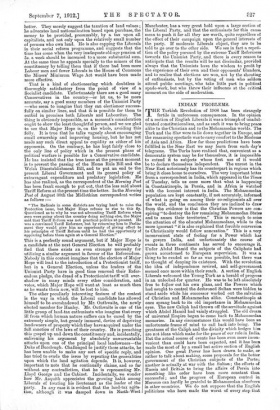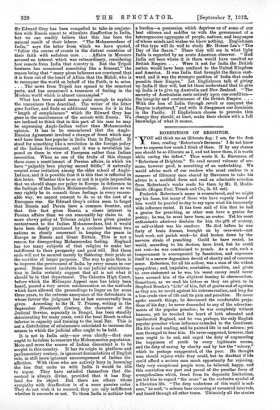INDIAN PROBLEMS. T HE Turkish Revolution of 1908 has been strangely
fertile in unforeseen consequences. In the opinion of a section of English Liberals it was a triumph of unadul- terated constitutionalism, and as such it was to bring peace alike to the Christian and to the Mohammedan worlds. The Turk and the Slav were to lie down together in Europe, and the reassuring spectacle was to carry comfort to the Moslems of Asia and Africa. How far these predictions have been fulfilled in the Near East we may learn from each day's telegrams. The Turks have realized that, convenient as a democratic system may be for themselves, it is impossible to extend it to subjects whose first use of it would be to declare themselves independent. The unrest in the Near East notoriously has its counterpart in regions which bring it close home to ourselves. The very important letter from a correspondent in India, which appeared in the Times of Tuesday, tells us once more that what is happening in Constantinople, in Persia, and in Africa is watched with the keenest interest in India. The Mohammedan population are kept constantly, if not accurately, informed of what is going on among their co-religionists all over the world, and the conclusion they are inclined to draw from the evidence is that the Christian Powers are con- spiring " to destroy the few remaining Mohammedan States and to annex their territories." This is enough to seize the attention of the educated Mohammedans, while to the more ignorant "it is also explained that forcible conversion to Christianity would follow annexation." This is a very inconvenient state of feeling for a Power which has to govern India, and unfortunately the course of events in three continents has served to encourage it. Under Abdul Hamid the subjects of the Caliphate had grown accustomed to European supervision. It was a thing to be evaded so far as was possible, but there was no thought of denying its existence. With the revolution the idea of independence revived, and self-government seemed once more within their reach. A section of English Liberals welcomed the Young Turk as a herald of progress in an unlooked-for quarter. He was to be left absolutely free to follow out his own plans, and the Powers which had sought to control the dethroned Sultan were bidden to stand aside while his successor worked out the salvation of Christian and Mohammedan alike. Constantinople at once sprang back to its old importance in Mohammedan eyes. The new Caliph had thrown off the servitude against which Abdul Hamid had vainly struggled. The old dream of universal Empire began to come back to Mohammedan memories. In any circumstances this would have been an unfortunate frame of mind to call back into being. The greatness of the Caliph and the divinity which hedges him are not ideas which make for the peace of our rule in India.. But the actual course of events has been even more incon- venient than could have been expected, and it has been made the most of by a small but active section of English opinion. One great Power has been drawn to make, or rather to talk about making, some proposals for the better government of the Christian subjects of the Porte; another is actually at war with the Sultan ; the efforts of Russia and Britain to bring the affairs of Persia into something like order have been more constant than successful ; and the progress of European control in Morocco can hardly be grateful to Mohammedan observers in other countries. We do not suppose that the English politicians who have made the worst of every step that Sir Edward Grey has been compelled to take in conjunc- tion with Russia meant to stimulate disaffection in India, but we can readily believe that this has been the natural result of their labour. " The Mohammedans of India," says the letter from which we have quoted, " follow the course of events in the distant countries of their faith with sedulous care. . . . Affairs in Morocco aroused an interest which was extraordinary, considering how remote from India that country is. But the Tripoli business has occasioned something like a ferment," the reason being that " many pious believers are convinced that it is from out of the heart of Africa that the Mandi, who is to reconquer the world on behalf of the Faith, is to arise. . . . The news from Tripoli has spread to the remotest parts, and has occasioned a tenseness of feeling in the Moslem world which is almost unexampled."
What has been stated seems quite enough to explain the uneasiness thus described. The writer of the letter goes further, and finds an additional reason for it in the "length of complaisance" which Sir Edward Grey has gone in the maintenance of the entente with Russia. We are inclined to think that in this part of his case he may be expressing Anglo-Indian rather than Mohammedan opinion. It has to be remembered that the Anglo- Russian Agreement involved a change of front which may well have been less popular in India than in England. It stood for something like a revolution in the foreign policy of the Indian Government, and it was a revolution im- posed on them in view of European rather than Indian necessities. When as one of the fruits of this change there came a resettlement of Persian affairs, in which we have " palpably been playing second fiddle," it naturally created some irritation among the older school of Anglo- Indians, and it is possible that it is this that is reflected in this letter. -Whether this be so or not it is quite impossible that we should shape our policy in Europe in deference to the feelings of the Indian Mohammedans. Anxious as we may rightly be to consult those feelings in every reason- able way, we cannot consent to do so at the cost of a European war. Sir Edward Grey's critics seem to forget that Russia and Persia have a common frontier, and that this fact gives Russia a closer interest in Persian affairs than we can reasonably lay claim to. A more showy policy at Teheran might have given greater contentment to the Indian Mohammedans, but it would have been dearly purchased by a coolness between two nations so closely concerned in keeping the peace in Europe as Russia and Great Britain. This is not a reason for disregarding Mohammedan feeling. England has too many subjects of that religion to make her indifferent to their prosperity and good will. But these ends will not be secured merely by flattering their pride at the sacrifice of larger purposes. The way to gain them is to improve the government of India by every means in our power. Some recent incidents in our judicial administra- tion in India certainly suggest that all is not what it should be in that department. The Calcutta High Court, before which the Midnapur Appeal case has lately been heard, passed a very severe condemnation on the methods which have allowed the proceedings to linger on for some three years, to the extreme annoyance of the defendants in whose favour the judgment has at last unreservedly been given. According to Sir H. T. Prinsep, writing in the September Nineteenth Century, the character of the Judicial Service, especially in Bengal, has been steadily deteriorating for many years, until the local Bench is often inferior in capacity and training to the local Bar. This is not a distribution of attainments calculated to increase the esteem in which the judicial office ought to be held.
It is not in India only—nor even chiefly—that care ought to be taken to reassure the Mohammedan population. More and more the source of Indian discontent is to be sought in this country. It has its origin in platform and parliamentary oratory, in ignorant denunciations of English rule, in still more ignorant encouragement of Indian dis- affection. With those who are actively busy in loosening the ties that unite us with India it would be idle to argue. They have satisfied themselves that dis- content is always divine, provided that it has Eng- land, for its object. But there are others whose sympathy with disaffection is of a more passive order. They do not wish it to succeed, they are only indifferent whether it succeeds or not. To them India is nothing but a burden—a possession which deprives us of some of our best citizens and saddles us with the government of a heterogeneous aggregate of people, nations, and languages of whose minds and wishes we know nothing. Englishmen of this type will do well to study Mr. Homer Lea's " The Day of the Saxon." There they will see in what light India is regarded by an acute American observer. " Had India not been where it is there would have resulted no British Empire. . . . Were it not for India the British nation would have been confined to the United Kingdom and America. It was India that brought the Saxon east- ward, and it was the strategic position of India that made possible their Empire." Let Englishmen talk of giving up India if they will, but let them understand that to give up India is to give up Australia and New Zealand. " The security of Australasia rests entirely upon one condition— the integrity and continuance of the British Empire. . . . With the loss of India through revolt or conquest the Empire is shattered," and with it disappears our dominion. in the Pacific. If Englishmen choose to provoke this change they should, at least, make their choice with a full knowledge of what it means.







































 Previous page
Previous page